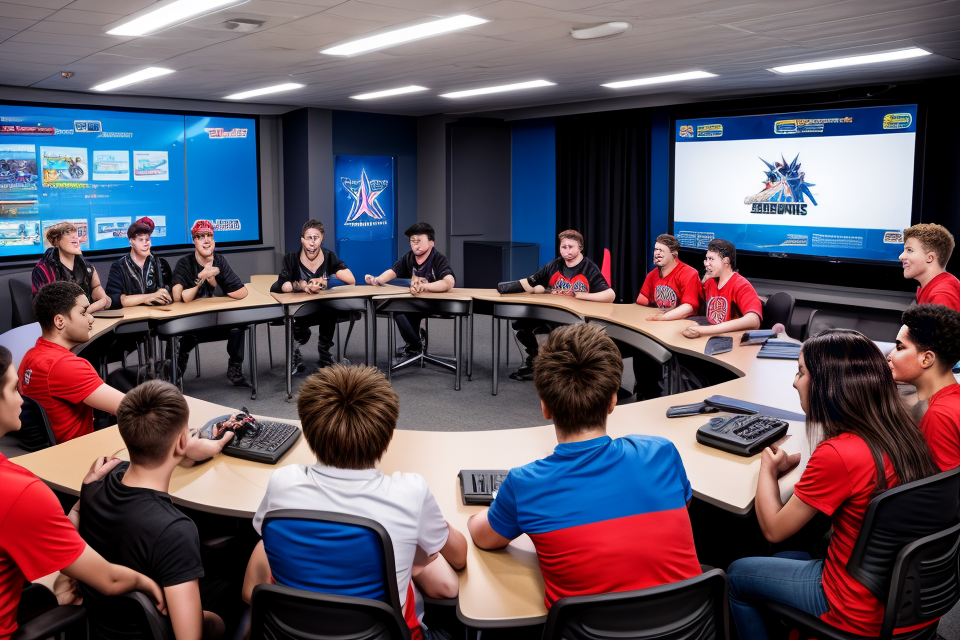The debate on whether video games should be recognized as a school sport has been a hot topic for years. Some argue that video games can provide the same benefits as traditional sports, such as teamwork, strategy, and physical exercise. Others believe that video games are a waste of time and do not offer any real benefits to students. In this article, we will explore both sides of the argument and provide a balanced perspective on the issue. Whether you are a gamer or a sports enthusiast, this article will provide food for thought on the future of sports in education.
The Rise of Esports and Its Impact on Education
The Growing Popularity of Esports in Schools
Esports has gained immense popularity in recent years, particularly among students. This has led to an increase in the number of schools that are offering esports as a recognized sport. Some of the reasons for the growing popularity of esports in schools are:
- Increased interest in gaming: The gaming industry has seen tremendous growth in recent years, with more and more people getting interested in video games. This has led to a surge in the number of students who are interested in competitive gaming, and as a result, esports has become a popular activity in many schools.
- The potential for scholarships and career opportunities: Esports is becoming a professional sport, with many colleges and universities offering scholarships for esports players. This has made esports a viable career path for many students, and as a result, more and more schools are offering esports as a recognized sport.
- The opportunity for teamwork and collaboration: Esports involves teamwork and collaboration, just like traditional sports. This makes it a valuable activity for students to participate in, as it helps them develop important social and communication skills.
- The potential for physical and mental health benefits: Esports can provide physical and mental health benefits, such as improved hand-eye coordination and problem-solving skills. Additionally, esports can be a great way for students to relieve stress and improve their overall well-being.
Overall, the growing popularity of esports in schools is a reflection of the changing interests and values of today’s students. As esports continues to gain recognition as a legitimate sport, it is likely that we will see even more schools offering esports programs in the future.
The Benefits of Incorporating Esports into Education
Esports have become increasingly popular in recent years, with many schools and universities offering competitive gaming as a sport. However, the debate on whether video games should be recognized as a school sport remains ongoing. In this section, we will explore the benefits of incorporating esports into education.
Developing Problem-Solving Skills
One of the main benefits of incorporating esports into education is that it can help students develop problem-solving skills. Esports often require players to make quick decisions, analyze situations, and develop strategies to overcome challenges. These skills are transferable to other areas of life, such as academic and professional pursuits.
Promoting Social Interaction
Esports can also promote social interaction among students. Many games require teamwork and communication, which can help students develop social skills and build relationships with their peers. This can be particularly beneficial for students who may struggle to connect with others in traditional sports or extracurricular activities.
Enhancing Engagement and Motivation
Incorporating esports into education can also enhance engagement and motivation among students. Many students are passionate about gaming and may be more motivated to attend school and participate in class when they can engage in competitive gaming. This can lead to improved academic performance and a greater sense of school pride.
Providing an Inclusive Environment
Finally, incorporating esports into education can provide an inclusive environment for students who may not feel comfortable participating in traditional sports. Esports can be a great way to engage students who may not have the physical abilities necessary for traditional sports, or who may not feel comfortable in the social environment of traditional sports. This can help create a more inclusive and diverse school community.
Arguments For Recognizing Video Games as a School Sport
Promoting Physical and Mental Health
- Physical Health: While video games may not require physical exertion like traditional sports, they can promote physical health in a unique way. For example, games like Dance Dance Revolution require players to dance along with the game, providing a form of exercise that can improve physical fitness.
- Mental Health: Video games can also promote mental health by reducing stress and anxiety. Some games, such as puzzle games, have been shown to improve cognitive function and reduce symptoms of depression.
* Social Interaction: Video games can provide a platform for social interaction, allowing players to connect with others from around the world. This can help build social skills and provide a sense of community. - Developing Skills: Playing video games can also develop important skills such as problem-solving, decision-making, and hand-eye coordination. These skills can translate to real-life situations and improve overall performance.
Fostering Social Skills and Teamwork
While some may argue that video games are a solitary activity, there is a growing body of evidence that suggests video games can actually foster social skills and teamwork in players.
One of the main reasons for this is that many video games require players to work together to achieve a common goal. Whether it’s defeating a boss, completing a mission, or building a structure, players must communicate, cooperate, and coordinate their actions in order to succeed.
This collaborative aspect of video games can help players develop important social skills such as communication, empathy, and problem-solving. Players must learn to listen to and understand their teammates’ perspectives, and they must be able to adapt their own strategies and tactics based on the strengths and weaknesses of their team.
Furthermore, many video games provide opportunities for players to work with others from diverse backgrounds and cultures, which can help to promote tolerance and understanding. By interacting with people from different backgrounds, players can learn to appreciate different perspectives and develop empathy for others.
Overall, the social and teamwork aspects of video games can have a positive impact on players’ social development, and can help to prepare them for success in a variety of settings, both in and out of school.
Providing a New Avenue for Talent Development
One of the primary arguments in favor of recognizing video games as a school sport is that it provides a new avenue for talent development. This is particularly relevant in today’s world, where technology and digital media play an increasingly significant role in our lives.
Video games offer a unique platform for young people to showcase their creativity, problem-solving skills, and strategic thinking. Playing video games requires a high level of focus, concentration, and quick decision-making, which are all essential skills for success in any field. Moreover, video games often involve teamwork, communication, and collaboration, which are critical aspects of sports and other team activities.
By recognizing video games as a school sport, schools can provide a more inclusive and diverse range of extracurricular activities for students. This would enable students who may not be interested in traditional sports to participate in school-sanctioned activities and develop their skills and talents. In addition, it would provide an opportunity for schools to invest in esports programs, which could include training, coaching, and facilities, and help students build careers in the growing esports industry.
Overall, recognizing video games as a school sport could help to unlock the potential of young people who have a passion for gaming and provide them with a pathway to success in the digital age.
Arguments Against Recognizing Video Games as a School Sport
Concerns Over Addiction and Obsession
One of the main arguments against recognizing video games as a school sport is the concern over addiction and obsession. Opponents argue that video games can be highly addictive and can lead to a number of negative consequences, such as decreased physical activity, social isolation, and neglect of schoolwork.
Addiction to video games has been linked to a number of negative outcomes, including depression, anxiety, and decreased academic performance. In extreme cases, some individuals have been known to play video games for days on end, neglecting their basic needs and leading to serious health problems.
Moreover, there is concern that video games can foster an unhealthy obsession with competition and winning, leading to aggressive behavior and a lack of empathy for others. This can have negative effects on a student’s social development and interpersonal relationships, as well as their overall well-being.
Some experts argue that the recognition of video games as a school sport could inadvertently encourage and perpetuate these negative behaviors, leading to even more widespread addiction and obsession among students. It is important to consider the potential negative consequences of promoting video games as a school sport and weigh them against the potential benefits.
Potential Negative Effects on Academic Performance
Some argue that recognizing video games as a school sport could have negative effects on academic performance. One concern is that students who participate in esports may spend less time on their academic studies, leading to lower grades and poorer academic performance. Additionally, the time and resources dedicated to supporting esports could detract from funding for other extracurricular activities, such as sports teams or music programs. Furthermore, some argue that video games are not a physical activity and should not be considered a sport, which could lead to a dilution of the meaning and importance of physical education in schools.
Perceived Lack of Physical Activity
- Traditional sports emphasize physical exertion, teamwork, and healthy competition
- Video games often involve sedentary behavior, lack of social interaction, and potential for addiction
- Some argue that recognizing video games as a school sport could lead to decreased participation in traditional sports
- Proponents of traditional sports argue that physical activity is essential for the overall health and well-being of students
- Schools have a responsibility to promote physical activity and discourage sedentary behavior
- The perceived lack of physical activity in video games could lead to a generation of unhealthy and inactive students
- Video games should not be considered a substitute for physical education or sports programs in schools
- Recognizing video games as a school sport could undermine the importance of physical activity and set a dangerous precedent for future generations
- It is important to prioritize physical activity and promote healthy lifestyles in schools, rather than accommodating sedentary interests
The Future of Video Games in Education
Exploring the Possibilities of Integration
- The potential benefits of integrating video games into the education system
- Increased engagement and motivation for students
- How video games can provide a more interactive and immersive learning experience
- How video games can help students develop problem-solving and critical thinking skills
- The potential for video games to enhance traditional subjects
- How video games can be used to teach subjects such as history, science, and math
- How video games can provide a more engaging and interactive way for students to learn and retain information
- Increased engagement and motivation for students
- The potential challenges of integrating video games into the education system
- Concerns about the potential negative effects of video games on students
- The potential for video games to be addictive and lead to decreased academic performance
- The potential for video games to expose students to violent or inappropriate content
- The potential for video games to be used as a substitute for traditional teaching methods
- The importance of maintaining a balance between traditional teaching methods and technology-based learning
- Concerns about the potential negative effects of video games on students
Potential Challenges and Limitations
While the integration of video games into the educational curriculum has shown promise, there are several potential challenges and limitations that must be considered. These include:
- Lack of standardization: The first challenge in recognizing video games as a school sport is the lack of standardization across different platforms and games. With numerous video games available, it can be difficult to determine which games should be included in the curriculum and how they should be played. This lack of standardization can make it difficult to establish clear guidelines and rules for competition, which is essential for creating a fair and inclusive environment for all students.
- Cost and accessibility: Another challenge is the cost and accessibility of video games. While some games are free to play, others can be expensive, and not all students may have access to the necessary hardware or internet connectivity to participate. This can create a digital divide, where students from lower-income backgrounds may be at a disadvantage compared to their more affluent peers.
- Mental and physical health concerns: Finally, there are concerns about the potential negative impact of video games on students’ mental and physical health. While some studies suggest that video games can have positive effects on cognitive development and hand-eye coordination, excessive gaming has been linked to increased rates of obesity, sleep deprivation, and social isolation. It is important to strike a balance between the benefits and drawbacks of incorporating video games into the educational system.
Overall, while there are several potential challenges and limitations to recognizing video games as a school sport, there is also significant potential for growth and innovation in the field of gamification. By addressing these challenges and developing best practices for integrating video games into the curriculum, educators can help to create a more engaging and effective learning environment for students of all ages.
Preparing for the Future of Esports and Gaming
As video games continue to gain popularity and mainstream acceptance, it’s clear that they are here to stay. This raises the question of whether or not video games should be recognized as a school sport. While some argue that video games are simply a form of entertainment and have no place in the realm of sports, others argue that they are just as legitimate as traditional sports.
One argument in favor of recognizing video games as a school sport is that it prepares students for the future of esports and gaming. Esports is a rapidly growing industry, with millions of dollars in prize money and a global audience of fans. By incorporating video games into the school curriculum, students can learn valuable skills that will prepare them for careers in this field.
For example, playing video games can teach students strategic thinking, problem-solving, and teamwork. These are all skills that are highly valued in the esports industry and are transferable to other careers as well. In addition, recognizing video games as a school sport can help to build a pipeline of talent for the esports industry, which is currently facing a shortage of skilled workers.
Furthermore, by recognizing video games as a school sport, students who excel at gaming can receive the same recognition and support as athletes in traditional sports. This can help to build their confidence and encourage them to pursue careers in the gaming industry.
In conclusion, the recognition of video games as a school sport is not only a matter of acknowledging their growing popularity, but also of preparing students for the future of esports and gaming. As the industry continues to grow, it’s important that we provide students with the skills and opportunities they need to succeed in this field.
The Verdict: Should Video Games Be a School Sport?
Weighing the Pros and Cons
Proponents of video games as a school sport argue that it has several benefits. Firstly, video games require players to be strategic and make quick decisions, which can improve problem-solving skills. Additionally, video games can help develop hand-eye coordination, reaction time, and spatial awareness. Furthermore, video games can be a form of socialization for students who may not have the opportunity to participate in traditional sports.
However, opponents argue that video games are not a physical activity and do not provide the same health benefits as traditional sports. They also argue that video games can be addictive and can negatively impact a student’s academic performance. Additionally, there may be concerns about the content of some video games, which can be violent or sexual in nature.
In conclusion, while there are certainly benefits to recognizing video games as a school sport, it is important to weigh these benefits against the potential drawbacks. Ultimately, the decision of whether or not to recognize video games as a school sport should be based on a careful consideration of all the available evidence.
A Final Word on the Debate
The debate on whether video games should be recognized as a school sport has been a contentious one, with valid arguments on both sides. On one hand, proponents argue that video games have many benefits for students, including improving cognitive skills, social interactions, and physical health. On the other hand, opponents argue that video games are not a traditional sport and should not be considered as such.
However, it is important to note that the debate is not about whether video games are good or bad, but rather about whether they should be recognized as a school sport. The answer to this question ultimately depends on the goals and priorities of the educational system.
If the goal is to promote physical health and activity, then video games may not be the best choice. However, if the goal is to promote cognitive development and social interaction, then video games may be a valuable tool. Ultimately, the decision should be based on the needs and goals of the students and the educational system.
In conclusion, while the debate on whether video games should be recognized as a school sport may continue, it is important to consider the potential benefits and drawbacks of incorporating video games into the educational system.
FAQs
1. What is the debate about?
The debate centers around whether video games should be recognized as a school sport. Proponents argue that video games require skill, strategy, and teamwork, just like traditional sports, and should therefore be given the same recognition and support. Opponents argue that video games are not physically active and do not promote the same values as traditional sports.
2. What are the benefits of recognizing video games as a school sport?
Recognizing video games as a school sport could provide many benefits, such as increased participation in extracurricular activities, improved teamwork and communication skills, and a more diverse range of sports options for students. It could also help to reduce the stigma associated with video games and encourage healthier gaming habits.
3. What are the potential drawbacks of recognizing video games as a school sport?
Some potential drawbacks of recognizing video games as a school sport include the perception that it is not as physically active as traditional sports, the potential for addiction and negative effects on mental health, and the possibility of prioritizing video games over other important school activities.
4. Are there any schools that already recognize video games as a sport?
Yes, there are some schools that have started to recognize video games as a sport. For example, the North American Scholastic Esports Federation (NASEF) provides opportunities for high school students to compete in esports tournaments, and some colleges have even started to offer scholarships for esports players.
5. How can schools implement video games as a school sport?
Schools can implement video games as a school sport by creating esports teams, offering extracurricular activities and clubs, and providing access to the necessary equipment and resources. It is important for schools to balance the benefits of video games with the potential drawbacks and ensure that students are participating in a healthy and safe manner.



